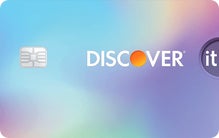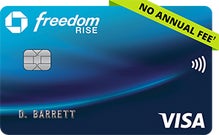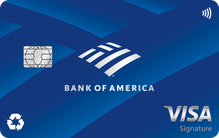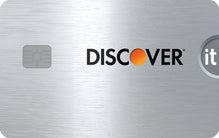Best student credit cards of February 2026
Advertiser Disclosure: Bankrate’s editorial team chooses and recommends the credit cards on this page. Our websites may earn compensation when a customer clicks on a link, when an application is approved, or when an account is opened. However, our recommendations and card ratings are produced independently without influence by advertising partnerships with issuers.
Filter by
Showing 7 results
Best overall student card
Intro offer
Earn $50
Rewards Rate
1% - 8%
Annual fee
$0
Regular APR
18.49% - 28.49% (Variable)
Why you'll like this: If you’re a student who spends mostly on grocery store purchases, restaurants, entertainment and popular streaming services, this card is all you need to earn cash back on your purchases.
Reward Details
What you should know
Card Details
Best for rotating cash back
Intro offer
Cashback Match
Rewards Rate
1% - 5%
Annual fee
$0
Regular APR
16.49% - 25.49% Variable APR
Why you'll like this: You can build credit, earn top-of-the-line rotating cash back rewards and take advantage of one of the best sign-up offers around.
Reward Details
What you should know
Card Details
Intro offer
$25 statement credit
Rewards Rate
1.5%
Annual fee
$0
Regular APR
25.24%
Why you'll like this: It offers a better flat cash back rewards rate than many student cards and requires no security deposit.
Reward Details
What you should know
Card Details
Best for intro APR
Bank of America® Unlimited Cash Rewards credit card for Students
Intro offer
$200
Rewards Rate
1.5% - 2%
Annual fee
$0
Regular APR
17.49% - 27.49% Variable APR on purchases and balance transfers
Why you'll like this: You can earn cash back on every purchase without worrying about reward categories and gain access to valuable financial education such as Better Money Habits.
Reward Details
What you should know
Best for travel
Intro offer
25,000 points
Rewards Rate
1.5X - 3X
Annual fee
$0
Regular APR
17.49% - 27.49% Variable APR on purchases and balance transfers
Why you'll like this: You can earn unlimited points for every dollar spent on purchases, which you can redeem for various travel expenses without any restrictions.
Reward Details
What you should know
Card Details
Intro offer
Cashback Match
Rewards Rate
1% - 2%
Annual fee
$0
Regular APR
16.49% - 25.49% Variable APR
Why you'll like this: It offers cash back on gas stations and restaurants, which makes it a good choice if you’re a student who commutes and dines out frequently.
Reward Details
What you should know
Card Details
Best for flat-rate cash back
Intro offer
Earn $50
Rewards Rate
1.5% - 5%
Annual fee
$0
Regular APR
18.49% - 28.49% (Variable)
Why you'll like this: This card combines unlimited flat-rate cash back on every purchase with an easy-to-earn Early Spend Bonus.
Reward Details
What you should know
Card Details
Remove a card to add another to compare
Remove a card to add another to compare
Compare Bankrate’s top student credit cards
| Card name | Best for | Card highlights | Bankrate review score |
|---|---|---|---|
|
Overall student card |
8% cash back on Capital One Entertainment purchases 5% cash back on hotels, vacation rentals and rental cars booked through Capital One Travel (terms apply) 3% cash back on dining, entertainment, popular streaming services and grocery store purchases (excluding superstores like Walmart® and Target®) 1% cash back on all other purchases |
4.6 / 5 Our writers, editors and industry experts score credit cards based on a variety of factors including card features, bonus offers and independent research. Credit card issuers have no say or influence on how we rate cards.
Apply now
on Capital One's secure site
|
|
|
Rotating cash back |
5% cash back on up to $1,500 per quarter of combined rotating category purchases (activation required), then 1% 1% cash back on all other purchases
|
5.0 / 5 Our writers, editors and industry experts score credit cards based on a variety of factors including card features, bonus offers and independent research. Credit card issuers have no say or influence on how we rate cards.
Apply now
on Discover's secure site
|
|
|
No deposit |
1.5% cash back on all purchases
|
4.2 / 5 Our writers, editors and industry experts score credit cards based on a variety of factors including card features, bonus offers and independent research. Credit card issuers have no say or influence on how we rate cards.
Apply now
on Chase's secure site
|
|
|
International students |
Up to 15% cash back on over 29,000 partner merchants Up to 10% random cash back after every eligible purchase Earn an additional 1% Unlimited Cashback with Firstcard Premium on all qualifying transactions |
|
|
|
Intro APR |
Earn 2% cash back on all purchases for the first year from account opening
Earn 1.5% cash back on all purchases after the first year from account opening |
|
|
|
Travel |
3 points per $1 spent on travel purchases booked through the Bank of America Travel Center |
3.9 / 5 Our writers, editors and industry experts score credit cards based on a variety of factors including card features, bonus offers and independent research. Credit card issuers have no say or influence on how we rate cards.
Apply now
on Bank of America's secure site
|
|
|
Commuters |
2% cash back at gas stations and restaurants on up to $1,000 in combined purchases each quarter (then 1%) |
3.9 / 5 Our writers, editors and industry experts score credit cards based on a variety of factors including card features, bonus offers and independent research. Credit card issuers have no say or influence on how we rate cards.
Apply now
on Discover's secure site
|
|
|
Flat-rate cash back |
1.5% cash back on purchases
Earn unlimited 5% cash back on hotels, vacation rentals and rental cars booked through Capital One Travel
|
4.6 / 5 Our writers, editors and industry experts score credit cards based on a variety of factors including card features, bonus offers and independent research. Credit card issuers have no say or influence on how we rate cards.
Apply now
on Capital One's secure site
|



















